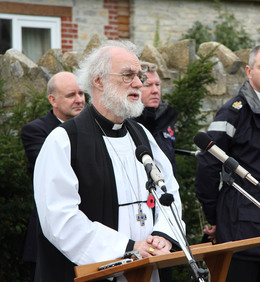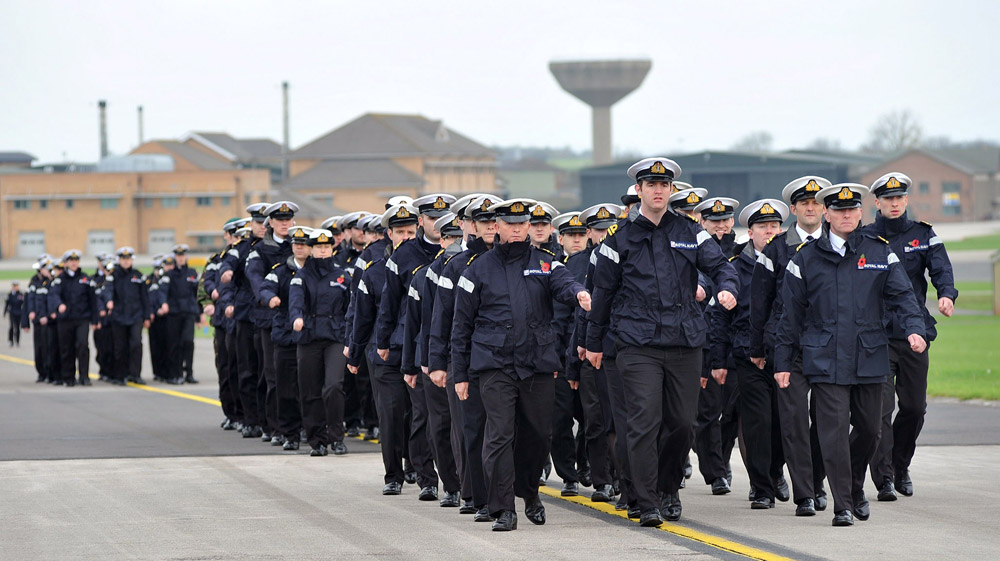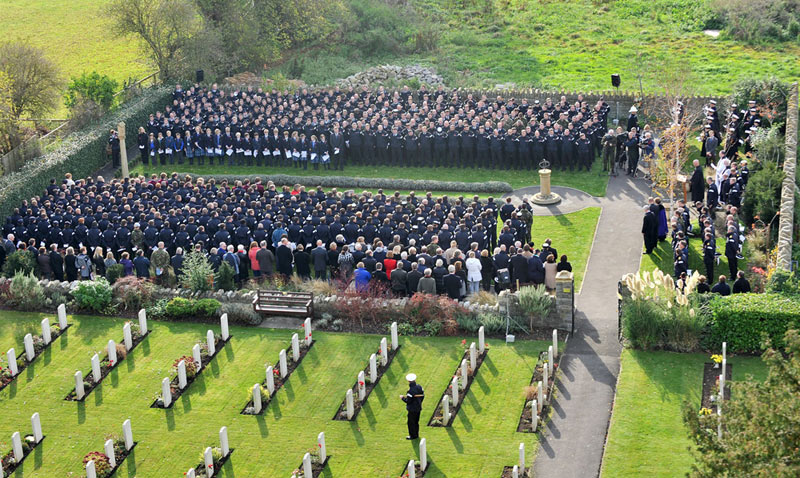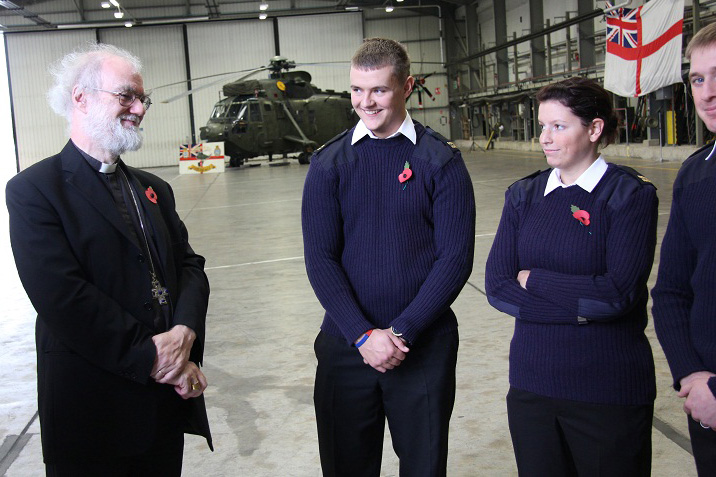Act of Remembrance at Royal Naval Cemetery

Friday 11th November 2011
On Armistice Day 2011, Archbishop Rowan Williams joined Sailors and Royal Marines from the Royal Naval Air Station Yeovilton for the annual Act of Remembrance in the churchyard of St. Bartholomew’s Fleet Air Arm Memorial Church.Dr Williams watched as platoons of RNAS Yeovilton service personnel marched across the airfield and took their places for the Service in the grounds of the spiritual home of the Fleet Air Arm.
Commodore Paul Chivers OBE, Commanding Officer RNAS Yeovilton said:
“No matter how busy we all are, we need to reflect on the sacrifices made by all of our Service personnel over the years and today we also remember those closer to home, here at RNAS Yeovilton. Squadrons and departments from the Air Station provide ever-increasing numbers of personnel for front-line, operational tasks and servicemen and women from Yeovilton are here today, to commemorate those who have lost their lives, not only in two World Wars, but also in more recent and current conflicts.”
During the Service, the Royal Navy and Royal Marines Roll of Honour was read out by the Base Warrant Officer, Warrant Officer 1 Steve Uzzell and detailed all Royal Naval and Royal Marine personnel who have lost their lives from 2010 to the present day. The Act of Remembrance was led by Reverend Tudor Botwood and Reverend Ned Kelly from RNAS Yeovilton and following the 2 minute silence Commodore Chivers laid a wreath.
 Taking the text that “No one has greater love than this: to lay down one’s life for one’s friends” the Archbishop spoke in his sermon of the “generous risks” being taken by the Armed Forces to make friends of strangers.
Taking the text that “No one has greater love than this: to lay down one’s life for one’s friends” the Archbishop spoke in his sermon of the “generous risks” being taken by the Armed Forces to make friends of strangers.
He said: “in the last ten years or so, the experience of those serving in the Armed Forces of the Crown has been, again and again, taking risks for the sake of strangers. People have been sent to distant parts of the globe, to unfamiliar cultures locked in quarrels and conflicts about which we know very little. The Armed Forces have been asked to go to those places, and take exactly the same risks that they would take for comrades, for family, for country. What has become one of the most complex but also one of the most extraordinary things about military service in our own generation is that our Forces have taken risks for the sake of strangers.
They have taken risks not because people are friends, but in order that they might become friends. Our Forces have been at work, not only in the great theatres of Iraq and Afghanistan but in many other places too, in order to make friends - in order to build harmony and trust between peoples in an age of deep anxiety and instability. Friendship doesn’t just happen, it happens when we sense in somebody else someone we can trust. And there can be no greater token of trustworthiness than being willing to take risks.
So for our servicemen and women who go and take these massive mortal risks in distant places for people we might regard as strangers, that is one of the most effective tools there could be of building friendship. We show we are willing to take risks, even for those we don’t know, so that they may become friends, so that there may be harmony. And that requires an enormous and unusual level of commitment. Commitment to a vision of a world that might be, and is not yet. A world where it’s possible for every stranger to become a friend. It requires a deep vision of what human beings may become, and are not yet.”
As a poignant reminder of the sacrifices that have been made by members of the Fleet Air Arm, the Swordfish aircraft from the Royal Navy Historic Flight flew past the churchyard as the bugler finished the Last Post.

Rear Admiral Terry Loughran, Chairman of the Fly Navy Heritage Trust said:
“St Bartholomew’s holds a special place in the hearts of all FAA personnel, past and present. It is part of our heritage and we are the custodians; where better to remember our fallen.”
Service personnel were joined by many of the civilian employees from the Air Station together with children from Hazelgrove, Chilton Cantelo and Ilchester schools and members of the village community.
Talking in St Bartholomew’s Churchyard after the service the Archbishop said he had come to Yeovilton because: “It’s a really special place. It is not just that it is a centre of the Fleet Air Arm but also this beautiful church is a memorial to all that the Fleet Air Arm has contributed, so I am very glad to be here.”
 After leaving the Fleet Air Arm Memorial Church, Dr Williams was taken on a tour of the Air Station visiting the Air Traffic Control tower and 845 NAS where he met naval personnel that have recently returned from operations in Afghanistan.
After leaving the Fleet Air Arm Memorial Church, Dr Williams was taken on a tour of the Air Station visiting the Air Traffic Control tower and 845 NAS where he met naval personnel that have recently returned from operations in Afghanistan.
Read a transcript of the Archbishop's sermon below.
No one has greater love than this: to lay down one’s life for one's friends. That is a text that we see so often on war memorials around the country. In the older language that so many are more familiar with "Greater love hath no man than this that a man lay down his life for his friends". And it’s a text that calls to mind two very obvious things about the memory of war and military action. There is that dimension of taking risks for comrades, putting your own life on the line for the people who are next to you, and the dimension of putting your life on the line for your families, your communities, your country. All of that is clear enough - we know what it’s about. Truly to love a friend is to be willing to take risks for them. We know that, even in the most ordinary and everyday examples of friendship.
But in the last ten years or so, the experience of those serving in the Armed Forces of the Crown has been, again and again, taking risks for the sake of strangers. People have been sent to distant parts of the globe, to unfamiliar cultures locked in quarrels and conflicts about which we know very little. The Armed Forces have been asked to go to those places, and take exactly the same risks that they would take for comrades, for family, for country. What has become one of the most complex but also one of the most extraordinary things about military service in our own generation is that our Forces have taken risks for the sake of strangers.
They have taken risks not because people are friends, but in order that they might become friends. Our Forces have been at work, not only in the great theatres of Iraq and Afghanistan but in many other places too, in order to make friends - in order to build harmony and trust between peoples in an age of deep anxiety and instability. Friendship doesn’t just happen, it happens when we sense in somebody else someone we can trust. And there can be no greater token of trustworthiness than being willing to take risks.
So for our servicemen and women who go and take these massive mortal risks in distant places for people we might regard as strangers, that is one of the most effective tools there could be of building friendship. We show we are willing to take risks, even for those we don’t know, so that they may become friends, so that there may be harmony. And that requires an enormous and unusual level of commitment. Commitment to a vision of a world that might be, and is not yet. A world where it’s possible for every stranger to become a friend. It requires a deep vision of what human beings may become, and are not yet.
For the Christian, that vision is rooted in what we heard in the rest of the Gospel reading. We believe in a God who took the most extraordinary risk – to make us his friends. A God who in life and death served those who wanted to be his enemies, so that he might build community with them. A God who came to us, strangers to his love and his peace, and who offered his life so that there might be peace; lasting peace, universal community.
That inspiration, that vision, the humanity that might be and the world that might be, that continues to be part of what the Christian faith offers to the world. Because what the Christian faith offers to the whole human world is a rationale and a motive for this strange business of taking risks for people we don’t know, in contexts we barely understand, simply because we believe it’s possible that strangers can become neighbours, and that neighbours can live in harmony.
No-one has greater love than this – to lay down one’s life for one’s friends, to sacrifice a life, to risk a life for those who are close to us makes immediate sense. But a part of what we are celebrating today is that vision which allows us to lay down one’s life for one’s possible friends. For the friends that might be, for the friends that might be created when we show ourselves capable of taking generous risks for them, for that generosity, that sweep of unexpected imagination that makes friends out of strangers, that risk-taking for the sake of an unknown future. For that we give thanks today, and for the lives and examples those men and women who have been so possessed by that vision, so inspired and animated by that vision that they have indeed been willing to take such risks. To lay down their lives for God’s future of peace and of harmony - not just to witness to friendship that exists, but to make friendship for the future.
© Rowan Williams 2011
